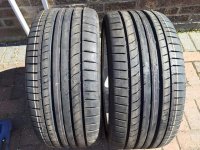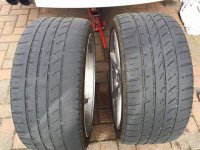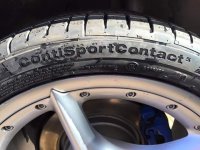Hi guys. On thursday of last week i had two new tyres fitted to the rear of my Z4, Continental sport contact 5. On Friday morning I set off for Oulton park circuit and had a great werkend watching the Mini Miglia racing. I came back up the road to Inverness yesterday and was almost home when the tyre pressure light came on. Everything seemed fine so i drove the last 5 miles to home and checked the tyre pressures. One of the rear tyres was at 82psi!! Now im no expert on these things but as it says 51psi max on the tyre and i had just driven 700 plus miles on this tyre. Will the tyre be damaged by this? It looks fine but i dont know if it might be weakened in any way. Please offer any advice as to what i should do. Demand a new tyre? Just forget it and count myself lucky it didnt go bang? Will it be ok?
Thanks in advance.
Andy.
Thanks in advance.
Andy.



